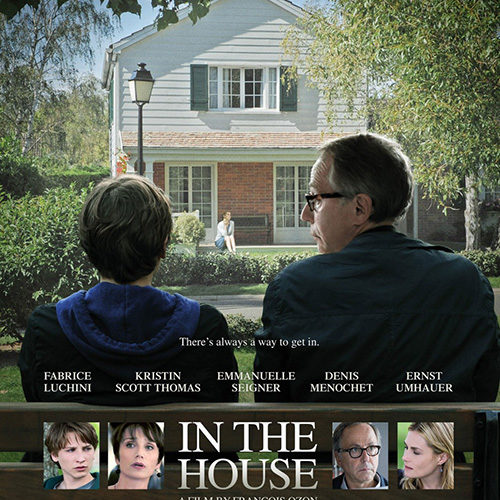What happens inside one’s home is sacred. Your skeletons are exposed, carefully manufactured façades rest for the night, and pent up frustrations boil to the surface in a cathartic outburst of unchecked emotion and fatigued spirit. This is why voyeurism has such a psychologically sensual appeal in its incomparable way of satisfying one’s desires, fantasies, and curiosity. When our lives hit a rut of dull monotony we find ourselves searching for outside entertainment—through books, movies, videogames, hobbies, or that unavoidable satisfaction of stumbling upon a secret we simply must see through to its end. We’ll hypothesize salacious conclusions, insert ourselves into the action, and reach complete absorption to the point where our reality suffers as a result. And just as we enjoy someone else’s troubles, others will clamor for more of ours.

This is the theme François Ozon toys with in his new film Dans la maison [In the House]. Adapted from Juan Mayorga’s play “El chico de la última fila” [“The Boy in the Last Row”], Ozon introduces us to bored high school literature teacher Mr. Germain (Fabrice Luchini) and his rapidly dwindling excitement towards the new year. Slogging through a pile of throwaway assignments meant to gauge his student’s aptitude for composition by posing the simple question “What did you do over the weekend”, he grows tired of the futility of grading to languish in a self-pity so deep he also can’t help but ignore his wife Jeanne’s (Kristin Scott Thomas) precarious occupational plight as gallery director of a museum without an willing owner. Only the strangely captivating work of young Claude Garcia (Ernst Umhauer) pique’s his waning interest.
Caught in this boy’s obsession with classmate Rapha Artole’s (Bastien Ughetto) seemingly idyllic home, Germain finds himself enraptured in the prose’s ambiguous state between fact and fiction. Believing it to be imaginative hyperbole on behalf of Claude, he takes the aspiring writer under his wing to teach him what it means to tell a story. Making notes on style, lending novels to help hone his voice, and even nudging the boy to change focus and beef up certain “characters”, Germain sits back and watches as his every suggestion finds Claude the character fulfilling his desires on the page. The question then remains whether or not Claude the student has brought those words to life inside the Artole’s house of mundane secrets and sexual prisons. Who is leading who on, what is real, and who’s fantasies are we the audience viewing?

There are deliberately constructed levels to In the House from Germain’s obsession overtaking integrity, Claude’s curiosity and sociopathic joy in control manipulating everyone around him, and the Artole family’s perfection shattering to reveal inevitable cracks beneath its otherwise impeccable exterior. Ozon wants us to peer in and make assumptions about each familial unit as they exit the tedium of their own to live vicariously through each other’s. Claude pines for a parent to guide his wiser than his years curiosity, Germain for the life of a successful writer he never achieved, and Rapha the confidence to exit his father’s shadow and be himself. Each uses the people who are using them, skewing the truth to satisfy personal desire until the story becomes too much too handle and the guilt of complicity sets in.
But we engage in this dance each time we buy a ticket at the movie theater—willfully leaving our lives behind to sit in the dark and experience those of others. While we’re able to escape after the credits, however, each new page of Claude’s story spills into Germain’s life. The boy’s characters are real; Rapha is in his class and the want to discover more leads this respected teacher down a path he cannot return from. It’s a story within a story that holds actual consequences as actions turn to blackmail and passivity to anger. An innocent story evolves into a suspense-filled melodrama of illicit relationships, overwhelmed bystanders, and the complete uprooting of lives. Much like Alfred Hitchcock’s Rear Window—beautifully homaged in Ozon’s final frame—curiosity will kill the cat.

Umhauer plays the Pied Piper that is Claude fantastically, creating drama where there was none and refusing to hold back when opportunity presents. Everything we see of him inside the Artole house comes from the words he writes—one scene even repeats as he heeds Germain’s advice about simplification. Does he inject himself into their private nuclear contingent and seduce not one but two of its members? Are their troubles as complicated and vast as he describes? Or is every little detail simply one more deliberately positioned morsel for Germain to grasp, twist, and react towards? Claude Garcia’s masterpiece soon becomes more than a story scrawled upon lined paper as he begins orchestrating his teacher’s very life, transforming it into the perfect metaphorical juxtaposition to Scott Thomas’ Jeanne’s subversion of visual art displayed at her museum.
With great turns from the Artole family—Mom (Emmanuelle Seigner), Dad (Denis Ménochet), and son—that play with a highly stylized sheen straight from the mind of their sixteen-year old orator, In the House becomes as fabricated as the lives it portrays. We try hard to distinguish truth from fiction and forget the whole is a story in itself. As with reality, the allure of the unknown brings the danger of relinquishing our own identity to become that with which we’re obsessed. Luchini’s Germain embodies us in his eagerness to escape inside a world he has no control over. He lets his own life implode so he may linger with one that not only isn’t his but may not be real at all. This is cinema in a nutshell. Ozon lures us in and doesn’t let go.
In the House opens in limited release on Friday, April 19th.

